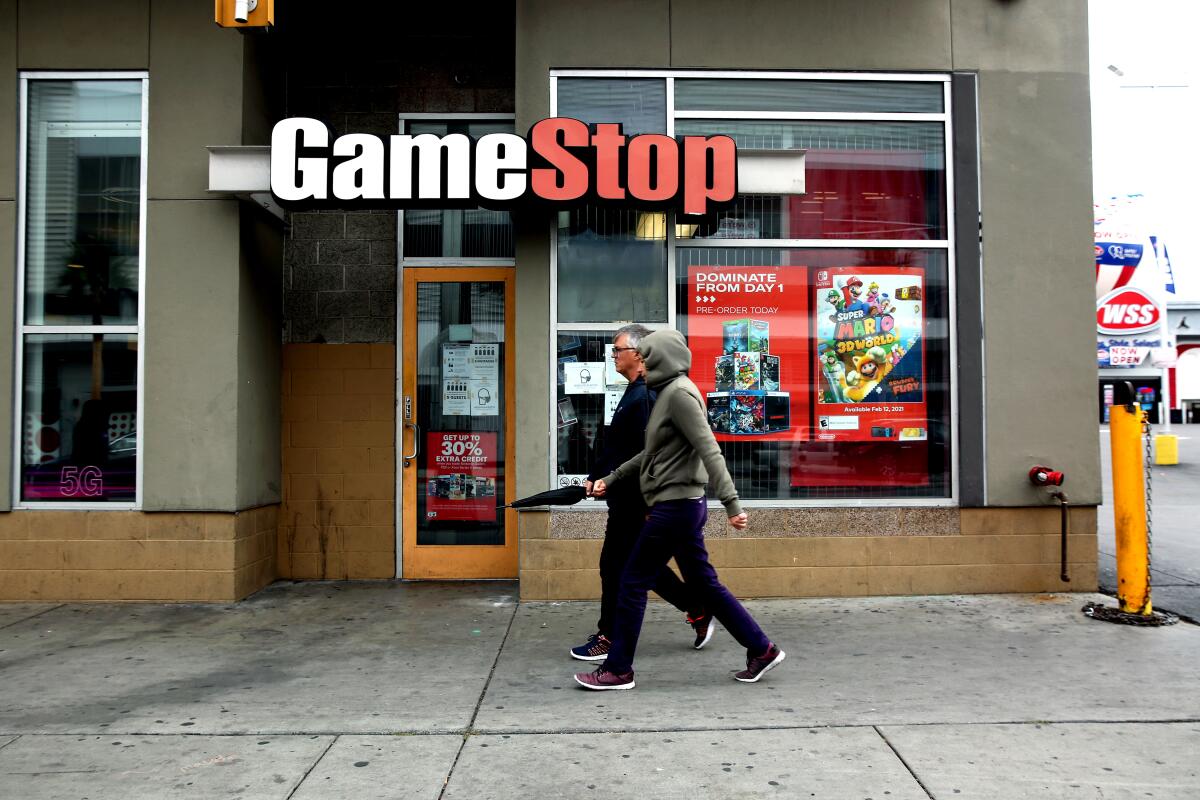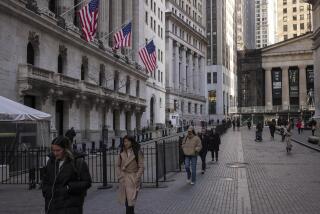Op-Ed: Want to stop the GameStop stock madness? Tax the winners more

- Share via
The public is enthralled by GameStop.
The stock of the moribund retailer jumped 19 times in price in three weeks. Small investors have made huge paper profits. Hedge funds have gotten clobbered. The financial pages are rife with talk of a “battle” between the little guy and Wall Street.
Who needs the Super Bowl? For that matter, is there any difference?
You bet there is. And the government should act to curb it.
To be clear, the public has no legitimate interest in which investors make or lose money. Melvin Capital, a hedge fund, reportedly lost 53% of its capital in one month, mostly by betting on GameStop shares to fall.
That is nobody’s problem other than Melvin Capital’s and its investors’.
The public interest lies in protecting the integrity of markets. “Integrity” means that prices reflect, as best as is nearly possible, expectations of future cash flow.
It may come as a surprise to video game players turned day traders, and to many hedge funds, but securities markets serve a vital social purpose. They are not casinos. They are not racetracks.
Markets exist to allocate capital. When Apple’s stock is higher than ExxonMobil’s, it is the market’s way of diverting capital from fossil fuels, where it is less useful, into digital phones.
Nobody cares if bettors lose money betting on the Tampa Bay Buccaneers or on Bitcoin, because they are speculations with no effect on the real economy.
But when productive assets are turned into trading vehicles, society suffers. This is what happened to the housing market in the early 2000s, admittedly a prenatal period for some GameStop aficionados.
This problem is not new. Economist John Maynard Keynes observed nearly a century ago, “Speculators may do no harm as bubbles on a steady stream of enterprise. But the position is serious when enterprise becomes the bubble on a whirlpool of speculation.”
What is new is the power of social media to turbocharge trading. A mere suggestion becomes a megaphone to a mob of blind followers. Crowds are vehicles for unthinking conformity, not for security analysis.
Based on the recent daily trading volume in GameStop, the entire corporation is changing hands every two days. This isn’t price discovery. It’s insanity.
Government cannot stop people from buying a stock. But it can distinguish between reasonable investment and Keynesian bubbles on a whirlpool.
First, let’s dispense with the myth of small-investor righteousness. The investors impassioned by social media are not the avatars of social good. They are the financial equivalent of the political day traders who stormed the Capitol.
Ted Cruz and Alexandria Ocasio-Cortez, populists of right and left, have opportunistically called for hearings into the decision by Robinhood, an online broker, to limit investment in GameStop and other stocks infected by social media crowd-following. Rep. Ro Khanna (D-Fremont) said Robinhood’s move “showed how the cards are stacked against the little guy in favor of billionaire Wall Street Traders.”
This is like saying everyone should have a mortgage, no matter their means. Remember how that worked out?
Secondly, it is not in the interest of small investors to help them win this “battle”— i.e., to encourage investment in a stock trading at 50 or 100 times what it is worth. Most of them will never get out at that price. If any considerable number tried to sell, the stock would fall quicker than Hank Aaron coming around on a fastball.
In fact, Robinhood was under intense pressure, from clearinghouses and regulators, to raise cash. When it and other platforms restricted trades, even temporarily, it did small investors a favor, by limiting prospective future losses.
The government has better ways to limit bubbles. The Federal Reserve, for instance, should make clear that it takes seriously its responsibility to protect markets. It has the power to raise margin requirements. If the mayhem continues, it should do so. Popping the bubble will lead to market losses. Failure to pop it now will inflate the bubble, leading to greater losses.
And Congress should act on a sensible remedy: a punitive tax on short-term trading. Currently, long-term investments (held for at least one year) are taxed as capital gains (up to 20%); short-term trades (less than one year) are taxed at higher ordinary income rates, or up to 37%.
The way to curb super-caffeinated trading is a more draconian short-term tax. Trades made under one month should be taxed at 60%. Less than two weeks: 80%. Less than three days: 90%.
This will not end speculation. But it will greatly moderate the most mindless variety of it. With after-tax profits greatly reduced, hair-trigger traders will gravitate to Las Vegas, where they belong.
Congress could compensate on the other end by reducing capital gains taxes on stock held for extended periods, such as three to five years.
A capitalist society has every interest in encouraging long-term investment. It has no interest in turning securities markets into a shooting gallery.
Roger Lowenstein is the author, most recently, of “America’s Bank: The Epic Struggle to Create the Federal Reserve.” @rogerlowenstein
More to Read
A cure for the common opinion
Get thought-provoking perspectives with our weekly newsletter.
You may occasionally receive promotional content from the Los Angeles Times.










